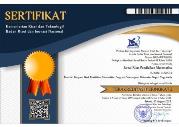MASTER (Motivating, Acquiring, Searching, Triggering, Exhibiting, Reflecting) learning model in terms of literacy ability and students' mathematics learning motivation
DOI:
https://doi.org/10.21831/jrpm.v9i1.48481Keywords:
Literacy, MASTER learning, motivationAbstract
It is argued that mathematical literacy skills might be improved when learning motivation is high. This study aims to examine the difference in mathematical literacy skills between students who joined a learning model that stimulate motivation, the MASTER learning model (Motivating, Acquiring, Searching, Triggering, Exhibiting, and Reflecting) and those who attended conventional learning in terms of high, medium, and low learning motivation. This is a quasi-experimental study with a population of all seventh-grade students of an Islamic Junior School in South Kalimantan, Indonesia. The sample was selected using the purposive sampling technique with group VII A as the experimental class and group VII E as the control class. The instrument used was a test of students' mathematical literacy skills and a student's learning motivation questionnaire. The data were analyzed using a two-way ANOVA. The results showed that: (1) there were differences in mathematical literacy skills between students who attended the MASTER learning model and those who took conventional learning; (2) there were differences in mathematical literacy abilities between students with high, medium, and low motivation to learn, and (3) there was an interaction between the MASTER learning model and learning motivation on students' mathematical literacy abilities.
References
Abidin, Y., Mulyani, R., & Yunansah, H. (2017). Pembelajaran Literasi. Bumi Aksara.
Akinyode, B. F. (2016). Students' Learning Style among Planning Students in Nigeria using Kolb's Learning Style Inventory. Indian Journal of Science and Technology, 9(1), 1–13. https://doi.org/10.17485/ijst/2016/v9i47/107129
Atsnan, Muh. F., Gazali, R. Y., & Nareki, M. L. (2018). Pengaruh pendekatan problem solving terhadap kemampuan representasi dan literasi matematis siswa. Jurnal Riset Pendidikan Matematika, 5(2), 135–146. https://doi.org/10.21831/jrpm.v5i2.20120
de Lange, J. (2006). Mathematical literacy for living from OECD-PISA perspective. Tsukuba Journal of Educational Study in Mathematics, 25, 13–35.
Jupri, A., Drijvers, P., & van den Heuvel-Panhuizen, M. (2014). Difficulties in initial algebra learning in Indonesia. Mathematics Education Research Journal, 26(4), 683–710. https://doi.org/10.1007/S13394-013-0097-0/TABLES/13
Kurniawan, D., & Wustqa, D. U. (2014). Pengaruh pendekatan problem solving terhadap kemampuan representasi dan literasi matematis siswa. Jurnal Riset Pendidikan Matematika, 1(2), 176. https://doi.org/10.21831/jrpm.v1i2.2674
Kuswidi, I. (2015). BRAIN-BASED LEARNING UNTUK MENINGKATKAN LITERASI
MATEMATIS SISWA. Al-Jabar : Jurnal Pendidikan Matematika, 6(2), 195–202. https://doi.org/10.24042/AJPM.V6I2.49
Lestari, K. E., & Yudhanegara, M. R. (2017). Penelitian Pendidikan Matematika. PT Refika Aditama. Martinah, A. S., Kharisma, O. H., Nasution, S. P., & Pahrudin, A. (2019). Pengaruh model pembelajaran
MASTER terhadap literasi matematis ditinjau dari perbedaan gender. Journal of Mathematics Education and Science, 2(2), 75–81. https://doi.org/10.32665/james.v2i2.94
Masjaya, M., & Wardono, W. (2018). Pentingnya Kemampuan Literasi Matematika untuk Menumbuhkan Kemampuan Koneksi Matematika dalam Meningkatkan SDM. PRISMA, Prosiding Seminar Nasional Matematika, 1, 568–574. https://journal.unnes.ac.id/sju/index.php/prisma/article/view/20196
Nilasari, N. T., & Anggreini, D. (2019). Kemampuan Literasi Matematika Siswa dalam Menyelesaikan Soal PISA Ditinjau dari Adversity Quotient. Jurnal Elemen, 5(2), 206. https://doi.org/10.29408/jel.v5i2.1342
OECD. (2013). PISA 2012 Results: What Students Know and Can Do (Volume I): Student Performance in Mathematics, Reading and Science, PISA.
Oktiningrum, W., Zulkardi, Z., & Hartono, Y. (2016). Developing pisa-like mathematics task with indonesia natural and cultural heritage as context to assess students mathematical literacy. Journal on Mathematics Education, 7(1). https://doi.org/10.22342/jme.7.1.2812.1-8
í–zkan, Y. í–., & í–zaslan, N. (2018). Student Achievement in Turkey, According to Question Types Used in PISA 2003-2012 Mathematic Literacy Tests. International Journal of Evaluation and Research in Education, 7(1), 57–64.
Paloloang, M. F. B., Juandi, D., Tamur, M., Paloloang, B., & Adem, A. M. G. (2020). Meta analisis: pengaruh problem-based learning terhadap kemampuan literasi matematis siswa di indonesia tujuh tahun terakhir. AKSIOMA: Jurnal Program Studi Pendidikan Matematika, 9(4), 851. https://doi.org/10.24127/ajpm.v9i4.3049
Rahyudi, H. (2012). Teori-Teori Belajar dan Aplikasi Pembelajaran Motorik: Deskripsi dan Tinjauan Kritis. Nusa Media.
Rose, C., & Nicholl, M. J. (2009). Accelerated Learning For The 21st Century Cara Belajar Cepat Abad
XXI. Nuansa.
Santosa, N., Waluya, St. B., & Sukestiyarno, S. (2013). Kemampuan Pemecahan Masalah Pada Pembelajaran Matematika Dengan Strategi MASTER dan Penerapan Scaffolding. Unnes Journal of Mathematics Education Research, 2(2), 33–52. https://doi.org/10.1007/S10857-006-9005-9
Shoum, L. R., Astutik, S., & Dina Handayani, ati. (2021). Metode Eksperimen dengan Teknik MASTER pada Pembelajaran Fisika di SMP. JURNAL PEMBELAJARAN FISIKA, 3(1), 96–102. https://doi.org/10.19184/JPF.V3I1.23246
Tanjung, Y. I. (2015). Pengaruh Konsep Accelerated Teaching Model MASTER terhadap Hasil Belajar Fisika Siswa. Jurnal Ikatan Alumni Fisika Universitas Negeri Medan, 1(1), 50–54.
Utami, C., & Nirawati, R. (2018). Pengembangan kemampuan literasi matematis melalui model pjbl dengan pendekatan realistic saintific dan pengukuran berbasis PISA. Aksioma: Jurnal Pendidikan Matematika, 7(3), 345–355.
van der Wal, N. J., Bakker, A., & Drijvers, P. (2019). Teaching strategies to foster techno-mathematical literacies in an innovative mathematics course for future engineers. ZDM, 51(6), 885–897. https://doi.org/10.1007/s11858-019-01095-z
Wijaya, A. (2016). Students' Information Literacy: A Perspective from Mathematical Literacy. Journal on Mathematics Education, 7(2), 73–82. https://doi.org/10.22342/JME.7.2.3532.73-82
Yuniati, S. (2012). Pembelajaran dengan Metode Accelerated Learning pada Materi Keliling dan Luas Lingkaran. Beta: Jurnal Tadris Matematika, 5(1), 57–74. http://www.jurnalbeta.ac.id/index.php/betaJTM/article/view/66
Downloads
Published
How to Cite
Issue
Section
License

Jurnal Riset Pendidikan Matematika by http://journal.uny.ac.id/index.php/jrpm/index is licensed under a Creative Commons Attribution-ShareAlike 4.0 International License.









